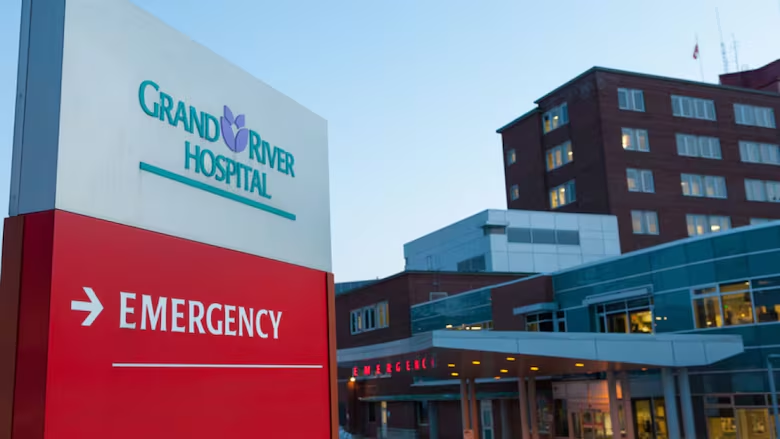Grand River Hospital's 68 job cuts will affect care, nurse predicts
Nurses union says cuts will hurt patients

The province needs to step up funding for hospitals, but hospital administration also has to stop cutting jobs every time there's a budget shortfall, the president of the Ontario Nurses' Association says.
"What's happening is the bean counters are basically cutting what the easiest thing to do is, cut the staff, because that's the majority of the cost," union president Linda Haslam-Stroud said in a telephone interview Wednesday following news Grand River Hospital in Kitchener is eliminating 68 jobs.
The hospital says the cuts are necessary due to a $10 million budget gap.
"I blame the province and the hospitals because the Government of Ontario, [Health Minister] Eric Hoskins and the MPPs are really staying silent," she said. "They're staying silent as a continued gutting of positions takes place."
Haslam-Stroud, herself a registered nurse (RN), said the hospitals need to be held to account as well because they talk about their own budgets, but they're not talking about how cuts will really affect patients.
"That's where I blame the employer. They're giving the same mantra out to the public … don't worry, patient care will not be impacted," she told CBC News.
RN, RPN positions cut
Of the 68 positions on the chopping block, 30 are already vacant and will be eliminated. That means 38 layoff notices will be handed out and a large number of those are going to RNs and registered practical nurses (RPNs).
Hospital president and CEO Malcolm Maxwell said 30 of the eliminated positions involve RNs – seven full-time and four part-time RNs will receive layoff notices. There were also 19 already vacant RN positions that were cut.
Some of those nurses, however, will likely find work elsewhere within the hospital where positions have been kept open with administration knowing cuts were coming, Maxwell said.
As well, five vacant RPN positions were eliminated while 12 workers were laid off.
But Maxwell said the numbers can be deceiving. Some of the eliminated positions were from a float pool of RNs and RPNs who would be on shift, but did not know where in the hospital they would be working until the day of their shift. The hospital has made some changes to the way it staffs temporary coverage in 35 different programs.
"We are going to have the same number of RPNs working on the units day-by-day in one of those programs," he told CBC News in an interview Wednesday.
Not 'reasonable' to expect funding rise
The hospital currently employs 3,335 people and has a $350 million annual budget. Maxwell said in a perfect world, they could go to the provincial government and ask for more money.
In this economy, it's just not possible. It hasn't been possible for the past five years.
"Healthcare represents better than 40% of provincial spending and the province has a budget problem, so I don't think it's reasonable that hospitals can expect funding to automatically rise and a rapid rate," he said.
Instead, they have to figure out ways to make changes that benefit the bottom line. That includes changing the way some areas are run – including what is called the "surgical hot room." In this case, rather than have a patient wait all day for surgery where a nurse has to care for that person, a room is kept open for urgent surgery needs.
"The patient gets the surgery that they need more rapidly and we also save money because we're not holding that patient and providing care for that time," he said.
Patients' death and disease rates will increase.- Linda Haslam-Stroud, president, Ontario Nurses' Association
Patients will notice
Haslam-Stroud said there is no doubt in her mind patient care will be affected.
"Patient's death and disease rates will increase, the evidence is very clear that that will happen," she said. Nurses won't be checking on patients are regularly or a patient who needs specialized care won't be placed in the right unit. If the patient's symptoms do not get picked up, it puts the patient's life in jeopardy.
"I am really concerned about where we're going with this," she said. "The extent of these cuts [is] going to be significant."
Several factors behind rising budget
Kitchener-Conestoga Conservative MPP Michael Harris said the province can do more to ensure the necessary funding is there for health care.
"These cuts fall at the feet of this [Premier Kathleen] Wynne Liberal government and its fiscal mismanagement – unfortunately when billions are wasted on gas plants and non-existent e-Health registries, it means less for the priorities we all share," Harris said in an emailed statement.
But Maxwell said rising costs – including paying more for drugs, supplies and wages – adds up over time.
"I think many people do understand the whole health system is facing some challenges with costs and balancing that with funding," he said.
But he noted in a national comparison, the hospital had the fourth best safety record in terms of patient outcomes and staff received a commendation for their work.
"People are always concerned about the health system. I believe our staff here have been able to show that they're providing a good standard of care," Maxwell said.